General Butt Naked - A former Liberian warlord who pleas for justice
For this edition of The Bright Continent, I discussed the challenges that Liberia faces with a former child soldier and travelled into the Liberian Highlands to meet with an ex-warlord.
Michael Miller ambled along the sidewalk near a large supermarket. About a hundred meters away, slightly hidden the shades, two of his friends leaned on their crutches. They were missing limbs. Dozens of chains hung from Michael's arm, metal jingled in his hands. He eagerly showed me small, copper crosses made from empty bullet casings. He used them to ask for forgiveness (and a few dollars) for the atrocities he committed as a child soldier during the Liberian Civil War. Some of his friends, former child soldiers as well, had a different approach according to Michael. Accompanied by village elders, they sought for forgiveness in conversation with the relatives of their victims.
As Michael was intoxicated and pressured by warlords back in the days, I asked him to what extent he felt responsible for the atrocities he committed as a child. "Regardless of the pressure of the warlords, the sense of guilt is still overwhelming," he emphasized. Michael said he slept poorly. When darkness fell, his thoughts wandered to his lost youth, his dreams were haunted by the clatter of weapons and each morning was filled with remorse. He contemplated following his friends' example, hoping that his apology would bring him and the relatives peace.
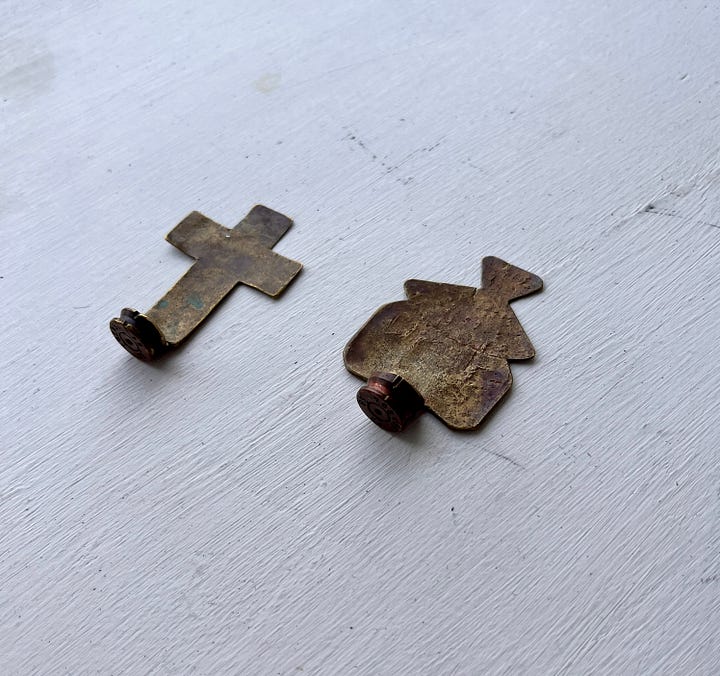

Since the first and second civil war (1989-1997 and 1999-2003) came to an end, Liberia, which is shoved up against the coast by Cote d’Ivoire and Guinea, has failed to bring war criminals to justice. Some of the former warlords even hold powerful positions in politics or business nowadays, refusing to be held accountable for their crimes. They live comfortable lives while being responsible for tens of thousands of victims and collectively indoctrinating over twenty thousand children into wearing military uniforms. Children as young as six were given berets and handed AK-47s in the nineties. Murder was rewarded, drug use encouraged. It resulted in a traumatized generation of young adults who have difficulty to find their way in society. Some struggle with addiction, others are missing limbs, but most of the former child soldiers have learned to live with their past. Without a social safety net, they work as (motorcycle) taxi drivers, street vendors, or security guards. During the day, they gather on the streets, share their food, and look out for each other.
After I met Michael, I was able to get in touch with one of many former warlords, living a relatively quiet life a few hours inland from Monrovia, Liberia’s capital city. He was still a teenager when the civil war erupted. These days, he stood out in comparison with other ex-warlords as he expressed regret for the misery he had inflicted on boys like Michael and families of his victims. His name is Joshua Milton Blahyi, but he is better known as General Butt Naked. He was crowned as a tribal priest by village elders at the age of eleven, a position of great responsibility. Eight years later, on the eve of the civil war, young Joshua was appointed as the general of a militia of child soldiers whom he led into battle naked, which explains his remarkable nickname. Joshua was convinced that it would protect him and his soldiers from flying bullets.
Towards the end of the civil war, Joshua said he met Jesus just at the frontlines. He renounced the devil and has since been conducting church services across the country. However, he prefers to spend most days in the seclusion of the Liberian hinterlands. Infamous as he was, he seemed beloved in the area nowadays. The first villager I asked for directions eagerly and dutifully got into the car to show me the way. He explained that he gave Joshua the benefit of the doubt and seemed rather intrigued by his conversion from devil worshiper to son of God. In a similar way, Joshua's representation of both darkness and light, piqued the interest of many Liberians.
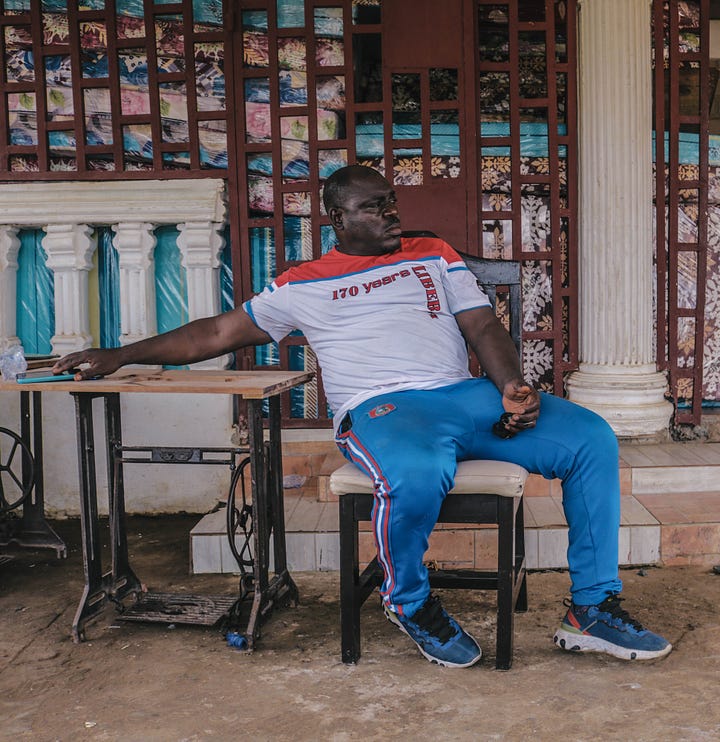
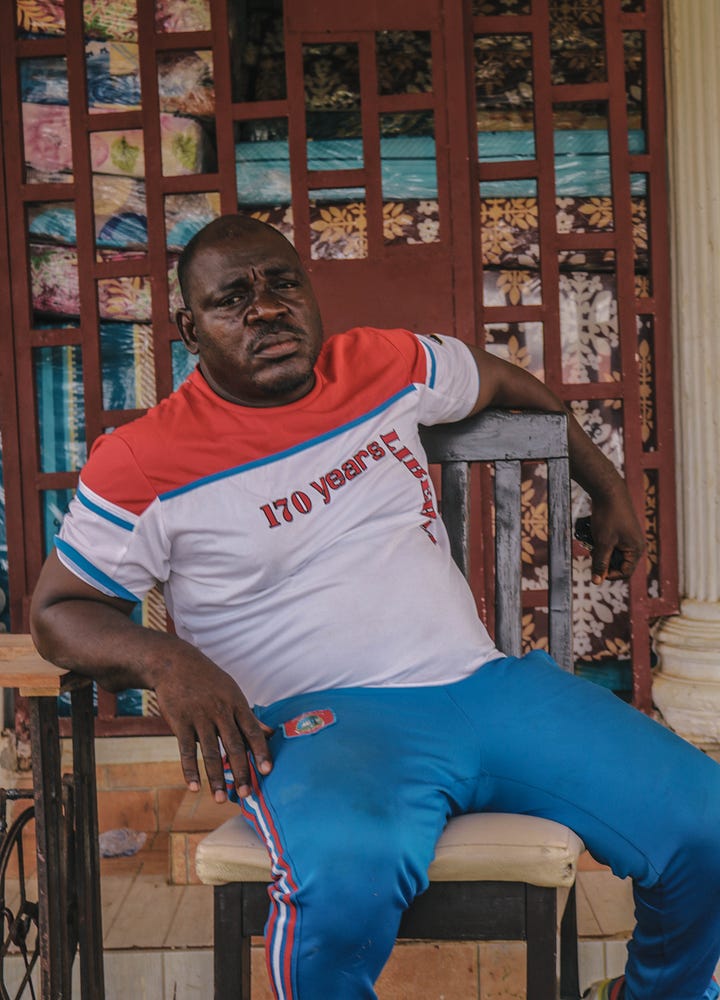
After a drive that took me half a day, I found him sitting in the porch of his house. He wore a tracksuit in the colors of the Liberian flag, while supervising 48 young men and women from the shades. They appeared to be former child soldiers, many of whom addicted to drugs, who couldn't survive without the help of others. In Liberia, they're called Zogos and make up the underclass of society. Joshua personally took them off the streets in Monrovia. He sends the young women to school while he builds houses in the village with the young men. In addition, he said he enlisted a psychologist to help his companions deal with their war traumas.
He told me that he and his army of child soldiers were responsible for over 20,000 deaths and cases of cannibalism. By eating the hearts of their victims, they hoped to obtain superhuman powers in battle. I froze, while he spoke in detail about one of the many massacres he had carried out. While staring at my notebook, I was unsure whether I should write it down. Unconsciously, I had already judged him. When I looked up after a while, I saw his tormented face. Dark circles took shape under his eyes, his atrocities seemed to haunt him. It was easy to label him a monster, call him evil or inhuman. But like the tens of thousands of child soldiers who were led into depravity, Joshua himself was a teenager when the civil war broke out. In that sense, he was both a perpetrator and a victim of violence, brainwashed and turned into a murderer by his own people. His heinous acts couldn't be justified, but in the context of Liberia, I could better attempt to understand the backgrounds to which these reprehensible actions took place.
His garden appeared to be as big as a football pitch, where large sleeping quarters were built to accommodate the youngest generation of children that lived in the streets of Monrovia and beyond. Next to the building, dozens of mattresses were ready for use. Under a nearby shelter, I heard the whine of a circular saw. Anthony, a former child soldier, was sawing wood for the bunk beds. When the dust settled, he brushed it off his swim trunks and stacked the planks on the grass. After a violent youth and no one to fall back on, he was grateful for Joshua's support. Former child soldiers who once fought for a hostile warlord were now friends, and the opportunity to talk to fellow survivors helped him to process his traumas. Joshua’s home provided Anthony with the peace he needed to work towards a better future.
Meanwhile Joshua, just like old generals do, bellowed at a young man who was building a wall. As a conductor of an orchestra of former child soldiers, he was strict, but also complimented them when a construction was completed. In general, the atmosphere seemed alright, my traumatized peers clearly felt at home here. Joshua provided them with much-needed support in a society where nobody seemed to care about their fate.
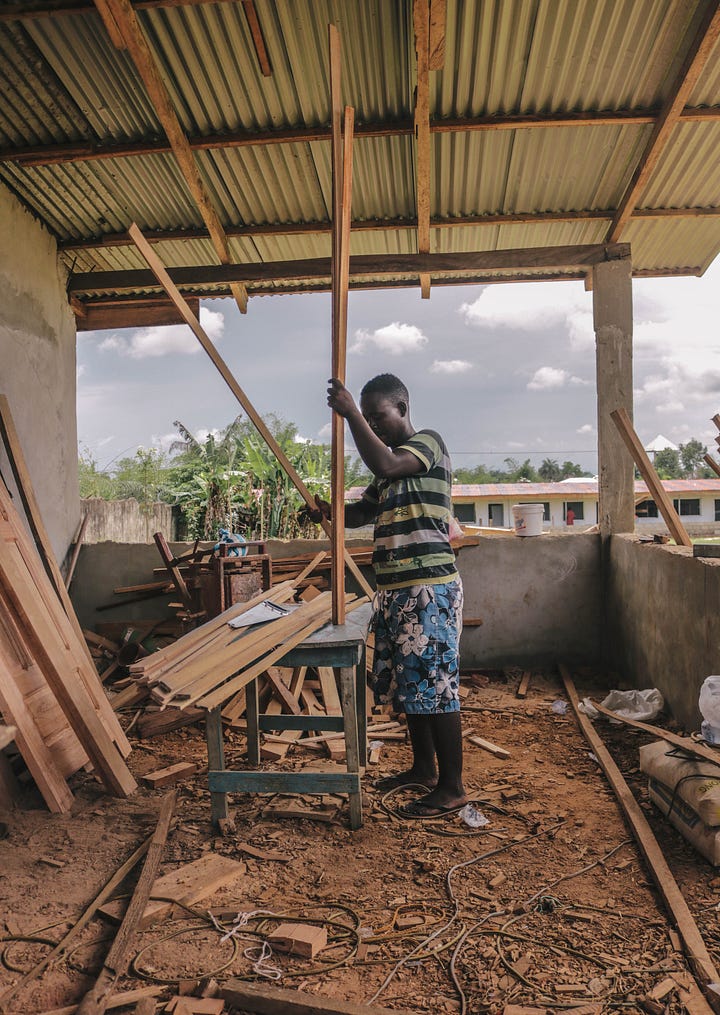
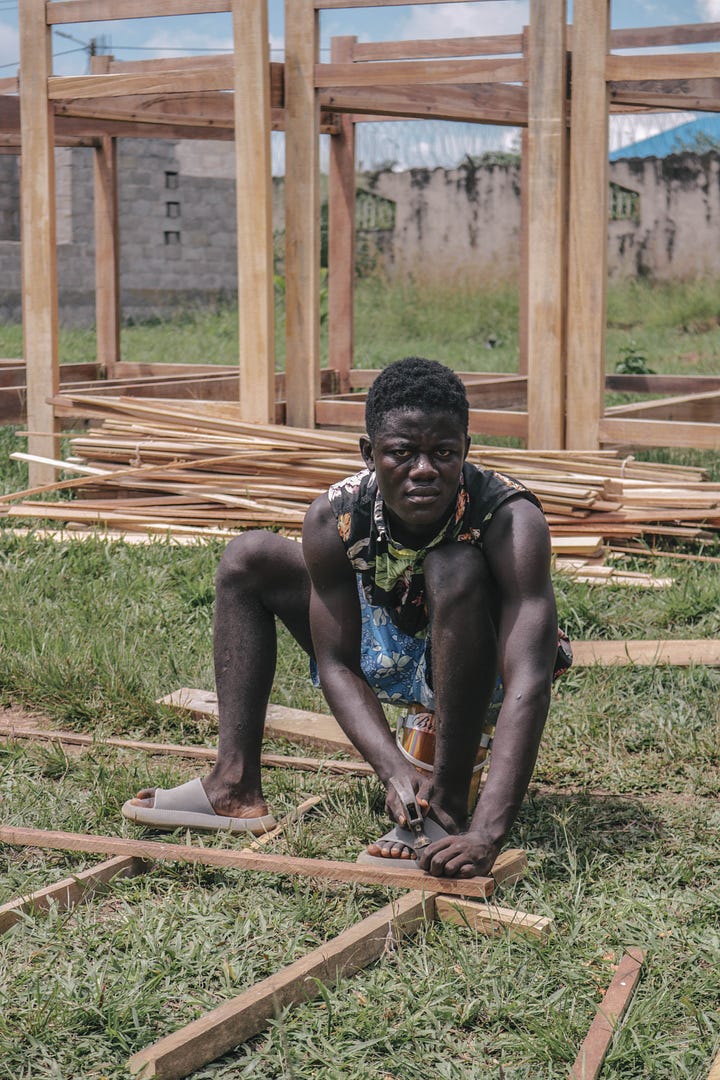
Then again, it did not absolve Joshua of the blood on his hands. Yet, unlike fellow warlords, Joshua wanted to be tried. According to him, Liberia is held hostage by the past, and justice is the only way out of contemporary misery. He called all other forms of forgiveness, as envisioned by Michael and his friends, hypocritical and useless. When I asked him why he wasn't in jail then, he frowned and looked at me intently. "I want to be held accountable for my actions, if that would mean I’d be sentenced and put behind bars, so be it," he said. He called it inevitable and the only right thing to do, but also stressed that a healthy legal system was needed for that. He refused to talk about other ex-warlords who resisted prosecution from within the political arena. "I can only speak for myself, try to make up for my mistakes, and plead for justice."
With his request to be tried, he exposed one of the greatest challenges that Liberia faces nowadays. Not only the ruins, former child soldiers, and traumas kept the civil war alive, the serious level of impunity was a legacy from the violent nineties as well. By never prosecuting anyone, Liberia has put individuals above the law and gave former warlords ample time to maneuver themselves into powerful positions. Since then, every attempt for justice has been thwarted by them. As a result, a dangerous precedent took shape, perpetuating the line of lawlessness from the civil war to present time.
Back in Monrovia, Michael shrugged when I told him about my encounter with Joshua and the fact that he was never tried. "We're not surprised by anything anymore, there's no point in getting worked up about it," he said. The resignation that many Liberians had found in their fate since the end of the civil war seemed to have descended like a heavy blanket over the country.
Though at the same time, I also somewhat understood why Michael and his friends had reconciled with their reality. "You can't teach old dogs new tricks," one of his friends said to indicate that they expected no change from politics or the judiciary field. They preferred to focus on things they could influence, such as each other's well-being and expressing regret to the victims' families.
That’s all for now folks. I hope you’ll stick around and it would be greatly appreciated if you tell people (to tell people) about this publication. Feel free to drop me a line in case of any questions or suggestions and don’t forget to have a look at the amazing work of the African creatives I work with here.
Daaf - Curator and founder of The Bright Continent





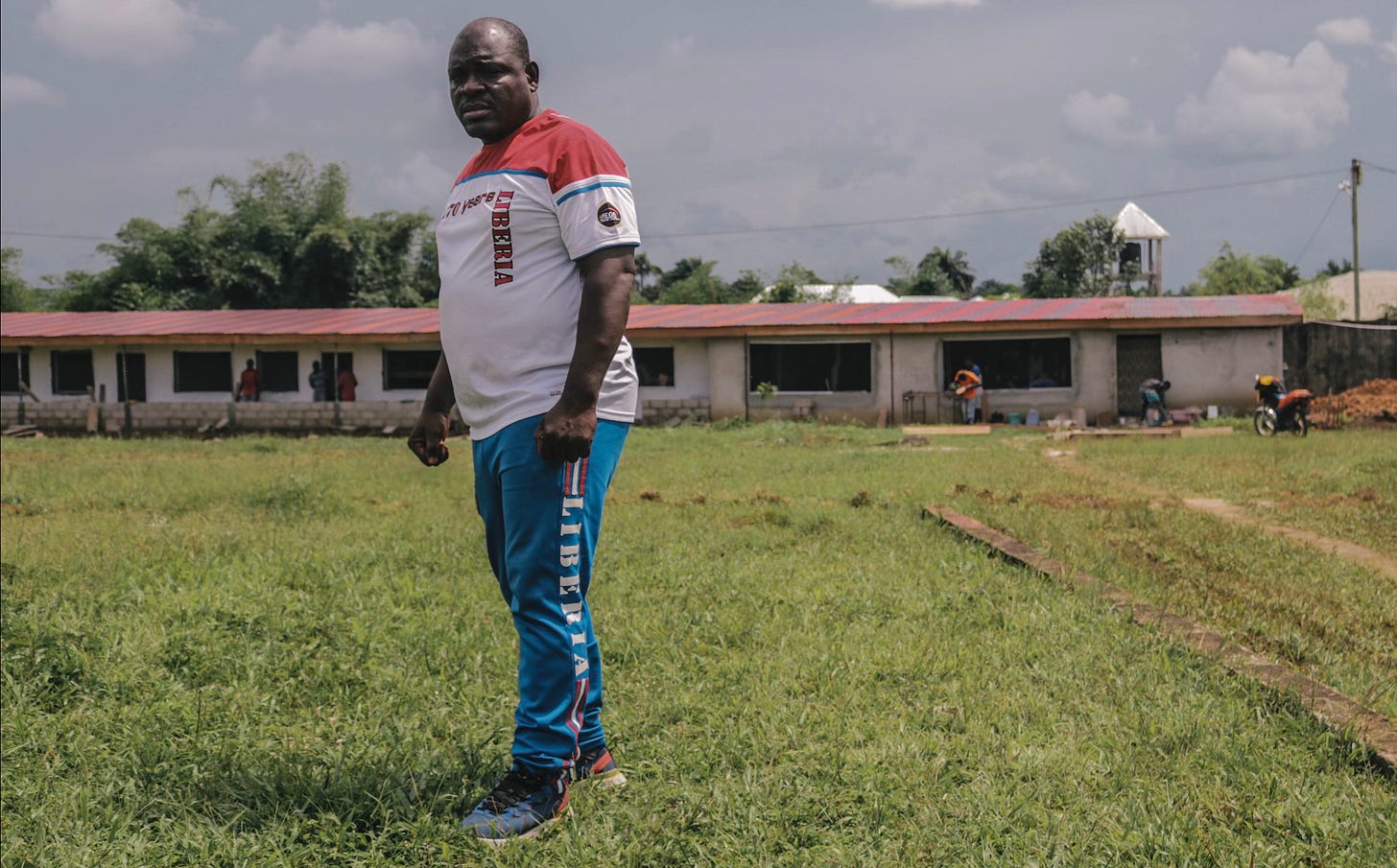
thank you for sharing !
Everyone deserves another chance, another chance at life, and to redeem themselves. I hope they find it.
I think that what one of those Zogos said that " they preferred to focus on things they could influence, such as each other's well-being" is probably one of the wisest things one can do to redeem ourselves. Take action into practical stuff, even small actions can go a long way towards a better life, both as individuals and as a society.
As always, a great and insightful article.
Best regards Daaf.